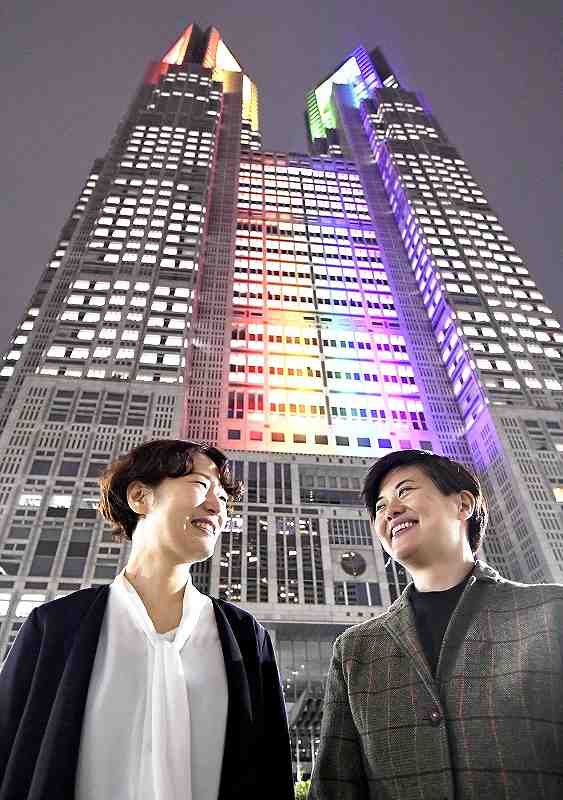
Soyoka Yamamoto, right, and Yoriko stand in front of the Tokyo metropolitan building in Shinjuku Ward, Tokyo, on Nov. 1.
13:54 JST, November 8, 2022
Tokyo launched a system Nov. 1 officially recognizing couples where at least one of the individuals is a sexual minority, giving them access to some of the same administrative services available to married couples. The system recognizes lesbian, gay, bisexual, transgender and queer or questioning (LGBTQ) partnerships.
A similar system was first introduced in Japan in 2015 in Tokyo’s Shibuya and Setagaya wards. Since then, more than 200 municipalities across the nation have adopted similar systems. Many such couples have expressed hope that society will come to a better understanding of their status.
“I’ve been looking forward to it,” said Soyoka Yamamoto, a 37-year-old office worker based in Minato Ward, Tokyo, as she looked up at the Tokyo metropolitan government building in Shinjuku Ward, which was illuminated in the rainbow colors of the LGBTQ symbol on the day.
Yamamoto recalled how she was attracted to a girl in the same grade while in elementary school, and worried that having feelings for another female might be a kind of sickness.
She once had a relationship with a man, but her attraction to women remained unchanged, she explained. Fretting that she could never be happy, Yamamoto said she contemplated suicide on multiple occasions.
However, meeting her future partner, Yoriko, while at college, gave her hope. Yoriko, 37, says she never tried to hide that she had romantic feelings for both men and women, which gave Yamamoto encouragement. They later started living together.
But Yamamoto says she struggled with the reality that they were not considered a family by others. For example, when Yamamoto collapsed at home and was rushed to a hospital by ambulance, the paramedics told Yoriko to contact Yamamoto’s family.
So when Tokyo began accepting applications for a partnership certificate under the new system, the couple immediately applied. “I want society to become a place where people can say they like someone without hesitation and for that to be accepted,” Yamamoto said.
224 local govts adopt system
In Japan, LGBTQ couples are not entitled to the same legal benefits as heterosexual couples, such as legal inheritance, joint custody and spousal tax exemptions.
Tokyo’s partnership system, however, makes it easier for such couples to access services if they have a metropolitan government-issued certificate. The system allows them to apply to move into metropolitan housing for families and receive information about the hospital their partner was taken to for emergency medical care among other services.
On the first day of the program, Tokyo issued certificates to 115 couples. According to a joint survey by Shibuya Ward and nonprofit organization Nijiiro Diversity, 224 municipalities had introduced similar systems as of July 1.
Tokyo’s introduction of an LGBTQ system means that more than 60% of people in Japan now live somewhere with such a system. “The system is now a widespread service for residents,” said Shinya Arita, an official of the NPO.
The private sector is also striving to be more inclusive of such couples. Cell phone companies such as Docomo Inc. offer them family discounts, while Sumitomo Mitsui Banking Corp. has made a joint mortgage loan program available to them.
Iris Inc., a real estate brokerage firm in Shinjuku Ward, said the number of housing units it had introduced to LGBTQ customers increased to more than 10,000 this year from about 100 in 2016.
There have been many cases in which landlords have refused to allow such couples to live in their respective properties, the firm said. Company President Akihiro Suto welcomed Tokyo’s new program, saying, “We can expect a large ripple effect.”
Meanwhile, corporate efforts to grant employee benefits to partners have yet to reach the halfway mark. A government survey found that less than 1% of companies grant congratulatory or condolence leave or family allowances to employees with such partners.
With the introduction of its system, the Tokyo metropolitan government now allows employees with such partners to receive support allowances and nursing care leave.
“We also want to encourage the private sector to understand gender diversity,” a Tokyo government official said.
Isolation
Despite the spread of partnership systems, many LGBTQ people still feel isolated. In fiscal 2020, Yorisoi Hotline, a free telephone consultation service, received 112,000 LGBTQ-related calls concerning love, marriage, prejudice and discrimination.
Nearly half of those who used the service said they had no one to talk to in their daily lives.
“Isolation and distress can be a serious, life-threatening problem,” said the official in charge of the hotline. “We hope that the expansion of the system will help create an environment where people can engage in dialogue with others.”
Top Articles in Society
-

Producer Behind Pop Group XG Arrested for Cocaine Possession
-

Man Infected with Measles Reportedly Dined at Restaurant in Tokyo Station
-

Man Infected with Measles May Have Come in Contact with Many People in Tokyo, Went to Store, Restaurant Around When Symptoms Emerged
-

Woman with Measles Visited Hospital in Tokyo Multiple Times Before Being Diagnosed with Disease
-

Australian Woman Dies After Mishap on Ski Lift in Nagano Prefecture
JN ACCESS RANKING
-

Producer Behind Pop Group XG Arrested for Cocaine Possession
-

Japan PM Takaichi’s Cabinet Resigns en Masse
-

Man Infected with Measles Reportedly Dined at Restaurant in Tokyo Station
-

Israeli Ambassador to Japan Speaks about Japan’s Role in the Reconstruction of Gaza
-

Videos Plagiarized, Reposted with False Subtitles Claiming ‘Ryukyu Belongs to China’; Anti-China False Information Also Posted in Japan



















